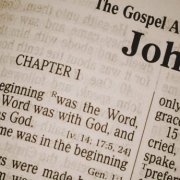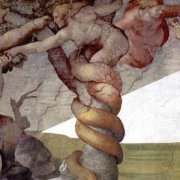What is the Apocrypha? Rediscovering Israel’s Story Between the Testaments
Imagine Israel before Moses
It is a nation enslaved, or maybe not even a nation yet. It’s more like a group of people, loosely related, now serving as fodder for the dreams of Pharaohs.
Their God, if he is there, is not speaking to them nor acting for them.
The straits are dire, and from all appearances this motley collection of family clans is on their own. They cry out to God, but the heavens are not answering.
Centuries of silence. Centuries of wondering if anything will ever change.
The rule of the foreigners is harsh. The years of relentless suffering are long. Nothing new is happening or showing any sign of happening.
It certainly doesn’t feel like much of a story for those who are stuck in the middle of it.
Now jump ahead about a thousand years
It turns out God finally did show up, calling Moses and the rescuing Israel. The people entered a new land and gained kings and princes and worship and wars. God had come down and made his home right in the midst of his people. Jerusalem—the city of the Great King—was built up and fortified, and right there on the eastern edge was the glorious Temple, God’s own dwelling place.
Then, devastatingly, all this was lost. Israel squandered her freedom, land, purpose, and apparently, even her story. This tribe that had its origins in the ancient story of Babel was now crushed and killed and those who remained were exiled back to Babylon.
In its main features, this situation of Israel in the years after the great Exile is not unlike that of the years of Abraham’s clans before the great Exodus. All that had been gained was now lost. If God is there, he’s stopped talking and stopped acting.
What has happened to their dreams, their divine election, their story? What has happened to their God?
Prophecy has ended. Israel has, at best, second-hand rulers appointed by foreign oppressors. After Babylon came Persia, then a succession of Greek kings, followed by Roman generals. Israel is trying for all she’s worth to keep it together under extreme cultural, political, and military pressure. It’s tenuous.
For their part, the Jews are stubborn. They are hanging on. But doesn’t everyone eventually reach their limit?
What has happened to their dreams, their divine election, their story? What has happened to their God? Once again, centuries of silence. Centuries of wondering if anything will ever change.
It is at this point that many Christ-followers dive into the New Testament Gospels and the arrival of Jesus. It’s understandable – for a lot Christians, that’s exactly what their Bible does. Malachi straight into Matthew.
But wait.
The story of Israel betwixt and between, after the First Testament yet before the New, is crucial for us. If we want to know the context that Messiah Jesus was born into, then we need to know the Apocrypha.
What is the Apocrypha?
This collection of books was written in the centuries immediately preceding Jesus and into the first century A.D. It’s the best place to learn about God’s people in the hard years right before Jesus. Here we find what Israel was thinking about, longing for, and trying desperately to do—the heart and soul of cultural and religious survival against the odds.
The word ‘apocrypha’ comes to us via Latin from the Greek for “to hide away.” And for far too many Christians these books have remained precisely that—hidden away, unknown, and even viewed with suspicion.
I grew up thinking the word Apocrypha simply referred to “weird Catholic books.” Which is ironic, because these are profoundly Jewish books, opening up the door to the world of 2nd Temple Judaism that is so important for understanding the entire New Testament.
The Jews did not include the Apocrypha in their canon of sacred writings, and neither, therefore, did the Protestant Reformers. Generally speaking the Roman Catholic and Eastern Orthodox churches do accept these books into their Bibles, under the title of deuterocanonical (or “second canon”) books. However, there is no single, firm list of which books are to be included here, with different communions accepting slightly different lists.
There are historical accounts, prayers, fascinating and insightful short stories, wisdom explorations, and apocalypses. Ezekiel’s vision had shown God rising up and leaving his home within the Temple in Jerusalem. Now God had gone silent and there were no contemporary prophets, so what could writers do? Many penned their works and spread them under the good names of the ancients like Ezra and Baruch. Some writings were simply additions to already trusted books like Esther. Some are catching up the narrative of Israel’s more recent history, like in the books of Maccabees.
At their heart, these writings reveal the struggles of Israel to confront its national life after the Exile. Things had gone so terribly wrong. What could Israel do to make sure a calamity like this would never happen again? How can Israel even be Israel under the constant pressure of foreign cultures—whether alluring or hostile? When and how will God’s presence return to them? Temple, land, victory, and God’s ruling over them as King. Will the full realities of these divine gifts ever be theirs again?
The answers found in the Apocrypha teach us much about the Judaism of Jesus’ time: the radical commitment to Torah observance, the doubling down on Jewish cultural distinctives, and the call to take up arms and fight, to give these beaten down people at least a little breathing room.
Here’s the thing: to know Jesus truly is to know the Judaism that is the context of his life. Jesus lived, worked, died, and rose again precisely within a first-century Jewish story. The only route to real comprehension of his accomplishment is to know that story. And this is exactly why the Apocrypha is of such great help to us. It catches us up on Israel’s story, and we see the Messiah so much more clearly because of it.
It’s time to reconsider our previous willingness to keep these books hidden away. If we bring them out into the light to read and learn them, more light in turn will shine on us.
In their Preface to the Apocrypha in the 16th c. Geneva Bible, the strongly Protestant editors urge readers to a significantly positive view: “as books proceeding from godly men they were received to be read for the advancement and furtherance of the knowledge of history and for the instruction of godly manners.”
A greater understanding of this Jewish history and piety provides real insight into the Messiah who came and brought life and light back to a Jewish story that had been in grave danger of sinking into the darkness.








